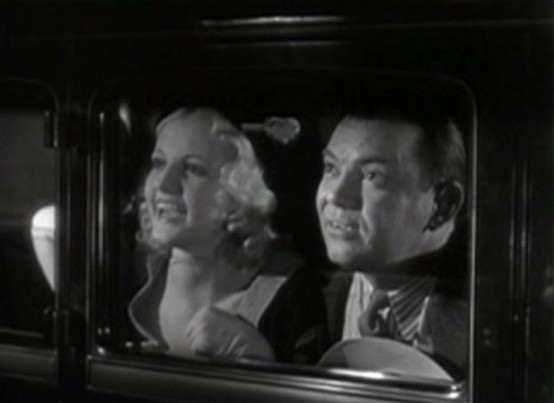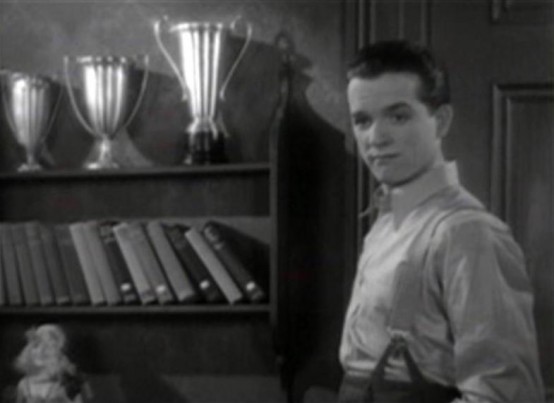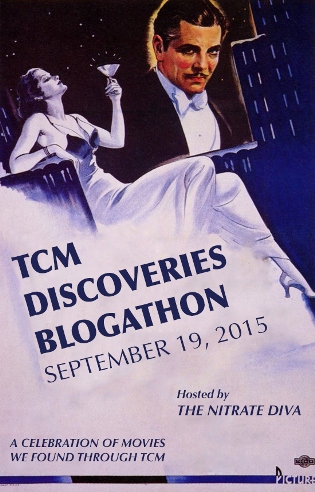“Let’s Movie,” says TCM, so The Nitrate Diva said let’s blog. This post is part of the TCM Discoveries Blogathon, a one-day event in which bloggers have been invited to share our favorite movie discoveries made through TCM. But there are so many! My selection, Young Bride, represents one of many movies TCM has introduced me to over the years that have made me sit back and think, 1) Wow, that exists!, and 2) Wow, I’m so glad that exists!.
You can discover this one on TCM for yourself this Monday, September 21, at 10:00 am EST. It’s the first time Young Bride has played on the channel in about two years, and it has never been released on home video, so be sure you set your DVR to record.
Young Bride, aka Love Starved, is a Great Depression slice of life featuring young adults in a lower middle class urban setting. It stars Helen Twelvetrees as Allie Smith, a young woman who has recently lost her mother, and loses herself in the wonders of the children’s section of the library where she works. Allie believes in fairy tales and Prince Charming. Eric Linden is Charlie Riggs, and, boy, he has more charm than he contain. A real player, too lazy to work, but imaginative enough to always have a big deal in the works. As much as I love Twelvetrees, and she’s very good here, Linden is masterful as her over-the-top obnoxious leading man. You almost want to smack this guy through the entire movie. Also on hand is another favorite, Arline Judge as Maisie, the bad girl, dance palace queen, who thinks she has her dance partner, Charlie, in her pocket. That is until the rest of the gang have a laugh at her expense after Charlie’s postcard arrives from Atlantic City, where he’s honeymooning with Allie. Maisie burns.
The film was based on Veneer, a play by Hugh Stanislaus Stange, that starred Henry Hull and Joanna Roos. It’s more famous for who took over as Charlie after Hull left the show: Spencer Tracy, whose name went up in lights outside a Broadway theater for the first time with the part (Curtis 120). The play was well-received by the critics who bothered with it, but it shut down shortly after Tracy joined the company. It moved from New York to Chicago, where it absolutely bombed, then disappeared until RKO-Pathé picked up the rights for this film. The play had a big backer in critic George Jean Nathan, who on more than one occasion, years after the fact, touted its failure as mystifying. The film received mixed reviews, the most negative coming from Variety, who savaged it as “just another picture about a rather cheap young couple …” and “a dull film record of an extremely uninteresting phase of city life.” Really? I’m more inclined to agree with the positive piece from the New York Times, who thought the characters of Young Bride were “recognizable as hundreds and thousands of young New Yorkers,” while adding, “the tawdry settings of lower middle class amusements are not exaggerated.”
Polly Walters, almost always found delightfully droning from a switchboard, isn’t this time. Her Daisy works in the library at the start of this one, but don’t worry, she really isn’t cut out for the place. For curious fans, Young Bride provides Miss Walters with a much bigger role than I can otherwise recall seeing her in, and, yes, you’ll still recognize her voice. For some reason she’s dating Cliff “Ukelele Ike” Edwards, and I say some reason not because Ike isn’t any good as boyfriend Pete. It’s just that he looks very much his age around a group of youthful actors who all appear a few years younger than they really are. Pete meets up with Daisy at the library hoping she can fix up his pal Charlie with a tomater that evening. What about the dame that works here, he asks, saying “she looks hot.”
“Hot like a Frigidaire,” Daisy replies.
“Well, maybe he can raise her temperature.”
Period atmosphere flows from the dialogue throughout the entire movie.
Straight-laced Allie isn’t at all interested in a date, but she’d be happy to tag along with Daisy for dinner. They’re sitting around the table when Charlie struts in, posture rail-straight, head held high. “Hi ya, Slug,” he greets Pete. “Hello, Dizzy,” to Daisy. Then he spots Allie and begins to prowl: “Am I dreaming, or is that a beautiful blonde over there?”
Allie is embarrassed and flattered when Charlie tells her he’s getting into the movie business and she ought to be in pictures. “Sure, I’d make a swell target for custard pies,” she says. Charlie blows hard about making movies for a few moments, stopping only to brag, “I’ve been all over. Calcutta, Rangoon, Mandalay. I never met a girl like you.” Allie finds this talk exciting, gushing, “Don’t you love the sound of those names.”
After she gets home that night her oldest friend, librarian Miss Gordon (Blanche Frederici) stops for tea, and gently tries to tell Allie that she should get out more often and mix with people her own age. “Sometimes I do get lonely,” Allie says. “But not for people. I get lonely thinking of places I’ve never been to. You know, far away places. Rangoon, Mandalay. Have you ever felt that way?”
Allie’s already hooked, but after Charlie left her, he met Maisie, a raven-haired heavy with a heart of iron, who quickly develops her own thing for Charlie. “You ever mix business with pleasure,” Charlie asks after she’s told him she makes her money dancing.
“What’s your idea of pleasure?” Maisie asks.
“What’s yours?”
She shimmies her shoulders, beams a naughty smile, and replies, “Boop oop a doop.”
But Maisie’s easy, and Allie’s sweet and beautiful, so Charlie pushes until he wins Allie’s hand. Allie buys his line and Charlie puts a little stone on her finger. The facade, or veneer if you like, begins to fade by the end of their Atlantic City honeymoon, when Allie discovers that Charlie’s big business talk with a Wall Street acquaintance was really about his coming back to work as a runner for thirty dollars a week. Oh, Charlie turns the job down flat, and hocks Allie’s wedding ring to pay the hotel bill.
Charlie continues to talk big business while waiting for it to fall in his lap. Allie tries to be polite about it, mentioning that it takes more than ambition, but time and hard work to get anywhere in life. “Work ain’t got nothing to do with it,” Charlie says. “Ninety-nine percent of the working, what have they got? It’s the one percent that are leaders that interest me.”
Charlie’s going nowhere, and as the movie rolls along it isn’t only Allie who begins to see that. His friends, well, they’re not very nice themselves. They know what he is, and the deeper we get into Young Bride the more they begin to chirp behind his back. Meanwhile, Allie becomes disillusioned as the sheen dulls on her own Wonderland populated by old friends like Peter Pan and Goldilocks. Charlie isn’t the Prince Charming she imagined. While she spends the days at work, he lazes on the couch reading magazines and pretending to brainstorm big business ideas. Allie eventually asks, “Honey, just for a little while, why don’t you stop trying to make a million overnight and get a regular job?”
She has a good reason to ask: “Charlie, I’m going to have a baby.”
He’s overwhelmed, flabbergasted, ruined by this news. “This is a swell time to get a kick in the pants like that.”
I told you he was a jerk. Anyway, Charlie composes himself, heads out, and begins raising a stake for the stork. Unfortunately, Allie thinks he’s just blowing more smoke—she’s stopped believing in this fairy tale. “Romance. Shining knights. What a joke. What a joke! It’s all over now, there’s nothing left,” she says, raging to Miss Gordon after finally giving Charlie the well deserved brush-off. Only then can Charlie really begin to see what he is, and just to make sure, his “pals” rub it in pretty hard.
Helen Twelvetrees has the lead, and plays it with appropriate innocence and sorrow, two of her specialties. But it’s Eric Linden and Arline Judge who have the meaty parts, and they are both outstanding. For Linden this contrasts well with another favorite, Big City Blues (1932), where he’s just as effective playing the small-town rube let loose in the big city. Arline Judge, man, she can sass you. She really is an unrepentant gold-digger in this one, just wait till you hear what she tells Linden before all hell breaks loose at the dance palace. I love Polly Walters, and really want to find her in more substantial supporting roles like this one. She’s got my favorite line in a movie filled with great lines. She comes to work hungover after staying out all night, and Allie advises that she really shouldn’t go around like that. Daisy replies, “I’m not going around, it’s this room. Make it stop!” Miss Gordon isn’t too happy with her.
What I love about Young Bride is that every character is flesh and blood. Despite the decades of separation, I know these people. And their places. The least recognizable of the bunch is the least ugly of the characters, Helen Twelvetrees as Allie. But she has the greatest growth, even if it comes with a loss. Charlie forces Allie to trade idealism for independence, but even as she loses faith in happy endings her story ends on an upswing. Maybe Charlie can one day even restore her faith in Prince Charming.
Directed by William A. Seiter for RKO-Pathé. Released in New York as Love Starved, but everywhere else played under the title Young Bride. Said to have opened April 8, 1932, though I’ve found newspaper reports of it playing in Midwestern theaters as early as March 25. Never released on home video.

Above: New York area ad for Young Bride under title Love Starved. Found in the Brooklyn Daily Eagle, April 17, 1932, page E-9.
For favorites found by other classic movie bloggers, be sure to check out The Nitrate Diva’s site, where all TCM Discoveries Blogathon participants are listed.
References
- Curtis, James. Spencer Tracy: A Biography. New York: Knopf, 2011.
- “Film Reviews: Young Bride. Variety. 19 Apr 1932, 15.
- “Movie Review: Young Bride.” New York Times. 15 Apr 1932.














PVR at the ready. Thanks again for showing me where I need to go.
You’re very welcome! I hope you enjoy it!
I enjoyed this film a lot – must agree Linden is very good and quite a contrast with his part in ‘Big City Blues’, as you say. Some great background info here on the other actors – I’ll watch out for Polly Walters!
There’s no chance of discovering anything like this on the UK TCM, I’m afraid!
Glad you liked this one, Judy, and I enjoyed your post on it as well. I was excited to see Linden and Big City Blues coming to Warner Archive’s Forbidden Hollywood Volume 9 … maybe we cross our fingers for Young Bride on a later (well, sooner than later!) edition!
On the plus side, I noticed it’s currently on YouTube.
Cliff, you continue to have one the most fascinating sites on the ‘net. I missed the showing of this movie, so I’ll have to keep up with your blog! I didn’t get the appeal of Helen Twelvetrees at first, but I finally saw “Millie”. Great film. Not enough of Joan Blondell in it for me though 🙂
Thanks so much, Doug! As just mentioned to Judy above, I just spotted Young Bride on YouTube in the past 48 hours or so … so it’s there if you want to check it out! Very good Twelvetrees, though especially good for Eric Linden! Glad you caught Millie—I’ve probably watched this movie 15 times this year alone in preparing the book, and it’s still holding up for me! Interesting part for Blondell as the “airhead” … she’s supposed to be so dopey, yet her character targets and gets exactly what she wants!